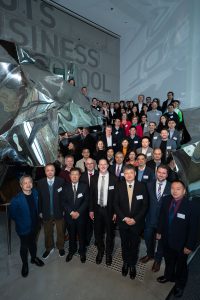The Inaugural Australia-China Energy Transition Forum& the 15th ISETS Energy Transition Forum
Host: University of Technology Sydney (UTS); International Society for Energy Transition Studies (ISETS)
Organizers: Australia-China Relations Institute, UTS; Faculty of Engineering and IT, UTS.

The Inaugural Australia-China Energy Transition Forum (ACETF) and the 15th ISETS Energy Transition Forum brought together key stakeholders to foster international cooperation in the rapidly evolving landscape of electric vehicles (EVs). Held on August 1, 2024, under the theme “Electrifying Tomorrow: Advancing Cooperation in the Industrial Chain of Electric Vehicles,” this forum was a landmark event co-hosted by the University of Technology Sydney (UTS) and the International Society for Energy Transition Studies (ISETS).
This pivotal gathering aimed to address the urgent global challenges of climate change and sustainable development by focusing on the critical roles that Australia and China play in the energy transition. As key players in the global EV market and critical mineral market, respectively, this forum provided a vital platform for discussing the multifaceted aspects of electric mobility, including critical mineral supply chains, and the challenges and opportunities that arise from the adoption and integration of EVs.
The ACETF 2024 featured presentations and panel discussions led by prominent figures from academia, industry, and government. These sessions explored the industrial policies, technological developments, and financial perspectives that are shaping the future of EVs in both Australia and China. Participants had the opportunity to engage with experts and peers, fostering collaboration that is essential for a successful and sustainable energy transition.
The event’s importance was further highlighted by the diverse representation of experts from various prestigious institutions. This included representatives from NSW Government departments, the Federal Chamber of Automotive Industries, China EV 100, the Electric Vehicle Council (Australia), BYD Australia, and universities such as the University of Technology Sydney, University of Sydney, Tianjin University, Huazhong University of Science and Technology, and the National University of Singapore. Moreover, the participation of major financial institutions, such as the China Construction Bank, underscored the critical role of investment in supporting this transition.
Key Messages from the Forum
- Adoption of EVs: The forum highlighted the significant potential for increased EV uptake in Australia, emphasizing the need to create a supportive environment addressing safety, convenience, and range anxiety. Participants suggested that non-fiscal policies, such as infrastructure development and public awareness campaigns, could be more effective than purchase subsidies in promoting mass-market EV adoption.
- Australia’s Value-Added Opportunities: Australia has substantial opportunities in the global EV supply chain due to its large deposits of critical raw materials (CRMs), renewable energy sources, and skilled workforce. However, the focus should be on providing high-skilled labor and export services, particularly in IT and software development, rather than competing in major EV component manufacturing.
- Partnership and Collaboration: The forum emphasized the mutual benefits of cooperation between Australia and China, particularly in building partnerships and long-term offtake agreements. Collaborative efforts in battery recovery technologies, project management, and international standards were highlighted as key areas for enhancing supply chain sustainability and making EVs more attractive to consumers.
- Investment Regulations and Political Climate: Australia remains an attractive destination for investment due to its resources, political stability, and skilled workforce. Establishing transparent and welcoming policies for Chinese investment in value-added partnerships is crucial for fostering a conducive environment for collaboration in the clean energy transition.
- Building Regional Ecosystems: The forum discussed the potential of building a regional ecosystem by leveraging Australia’s strengths in education, critical mineral extraction, and Southeast Asian market understanding. This approach could enhance bilateral economic ties and promote sustainable development in the region.
- Continuous Dialogue: Regular dialogue among business, government, and academia was recommended to advance cooperation in Australia-China EV development. The forum suggested that ISETS could play a crucial role in facilitating ongoing discussions and addressing emerging challenges in the energy transition.
The key messages (outcomes) from this forum are available at:ACETF Key Messages Final
The ACETF 2024 received sponsorship from China Construction Bank and is supported by the UTS Business School.
Time: 9.00am – 5.10pm AEST
Program
9.00 – 9.20am | OPENING SESSION
Speakers:
– Mr Iain Watt, Deputy Vice-Chancellor and Vice-President (International), UTS
– Dr Xiansheng Sun, Council Chair, International Society for Energy Transition Studies; Former Secretary General, International Energy Forum
– Mr Yangtong Jin, General Manager, China Construction Bank Sydney Branch
MC: Professor Xunpeng Shi, Research Principal, Australia-China Relations Institute, UTS; President, International Society for Energy Transition Studies
9.20 – 10.20am | SESSION 1: AUSTRALIA-CHINA RELATIONS
Speakers:
– Mr Terry Niemeier, Director, Program and Market Development Branch, NSW Department of Climate Change, Energy, the Environment and Water
– Professor James Laurenceson, Director, Australia-China Relations Institute, UTS
– Dr Wei Li, School of Business, University of Sydney
Moderator: Professor Wanning Sun, Deputy Director, Australia-China Relations Institute, UTS
10.50 – 12.20pm | SESSION 2: INDUSTRIAL POLICY AND DEVELOPMENT
Speakers:
– Mr Tony Weber, Chief Executive, Federal Chamber of Automotive Industries
– Mr Xiaoshi Liu, Executive Deputy Secretary-General, China EV 100
– Professor Zhongxiang Zhang, Founding Dean and Distinguished University Professor, Ma Yinchu School of Economics, Tianjin University; Director, China Academy of Energy, Environmental and Industrial Economics
– Professor Yongping Sun, Deputy Dean, Institute of State Governance, Huazhong University of Science and Technology
Moderator: Dr Xiansheng Sun, Council Chair, International Society for Energy Transition Studies; Former Secretary General, International Energy Forum
1.20 – 2.20pm | SESSION 3: DEVELOPMENT AND ADOPTION OF EVS AND RELATED TECHNOLOGIES IN AUSTRALIA
Speakers:
– Dr Scott Dwyer, Strategic EV Integration Project Lead, Institute for Sustainable Futures, UTS
– Professor Guoxiu Wang, Australian Laureate Fellow, School of Science, UTS
– Dr Marina Yue Zhang, Associate Professor – Research, Australia-China Relations Institute, UTS
Moderator: Dr Kaveh Khalilpour, Associate Professor, Faculty of Engineering and IT, UTS
2.20 – 3.20pm | SESSION 4: CHINA’S DEVELOPMENT IN ELECTRIFICATION OF MOBILITY
Speakers:
– Ms Maria Silos, Director of Public Relations and Marketing, BYD Australia
– Dr Pei Yu, Wuhan University of Technology
– Dr Yanfei Li, Associate Professor, Shenzhen Technological University; Adjunct Fellow, Economic Research Institute for ASEAN and East Asia
Moderator: Dr Muyi Yang, Adjunct Fellow, Australia-China Relations Institute, UTS; Senior Policy Analyst, Ember; Secretary, International Society for Energy Transition Studies
3.40 – 5.00pm | SESSION 5: FINANCIAL AND INVESTMENT PERSPECTIVES
Speakers:
– Ms Chanjie Qin, Head of Project Finance, China Construction Bank Sydney Branch
– Mr Tim Buckley, Director, Climate Energy Finance
– Dr Lixia Yao, Senior Research Fellow, Energy Studies Institute, National University of Singapore
– Mr Damian Meduri, Associate Director, Global Markets (Greater China), Trade and International, Investment NSW
Moderator: Professor Xunpeng Shi, Research Principal, Australia-China Relations Institute, UTS; President, International Society for Energy Transition Studies
5.00 – 5.10pm | CONCLUSION
Speaker:
– Professor Carl Rhodes, Dean, Business School, UTS

